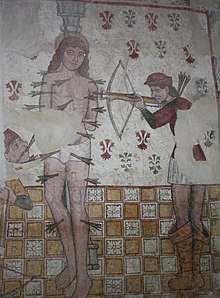besteiro
Galician

15th-century depiction. Santa María de Labrada, Guitiriz, Galicia.
Etymology
From Old Galician and Old Portuguese baesteiro (13th century, Cantigas de Santa Maria), from Latin ballistarius.
Pronunciation
- IPA(key): /bɛsˈteiɾo̝/
Noun
besteiro f (plural besteiros)
- crossbowman
- 1295, R. Lorenzo (ed.), La traducción gallega de la Crónica General y de la Crónica de Castilla. Ourense: I.E.O.P.F., page 323:
- Et ena vila auia moytos boos beesteyros, que du elles feriã nõ tĩjna prol escudo nẽ outra arma
- In this town there were many good crossbowmen, and where they hit, the shield or other weapons were useless
- Et ena vila auia moytos boos beesteyros, que du elles feriã nõ tĩjna prol escudo nẽ outra arma
- 1295, R. Lorenzo (ed.), La traducción gallega de la Crónica General y de la Crónica de Castilla. Ourense: I.E.O.P.F., page 323:
Derived terms
- Basteiro
- Besteiro
- Besteiros
- Bestilleiro
- Bistilleiro
Related terms
References
- “baesteiro” in Dicionario de Dicionarios do galego medieval, SLI - ILGA 2006-2012.
- “besteiro” in Xavier Varela Barreiro & Xavier Gómez Guinovart: Corpus Xelmírez - Corpus lingüístico da Galicia medieval. SLI / Grupo TALG / ILG, 2006-2016.
- “besteiro” in Dicionario de Dicionarios da lingua galega, SLI - ILGA 2006-2013.
- “besteiro” in Tesouro informatizado da lingua galega. Santiago: ILG.
- “besteiro” in Álvarez, Rosario (coord.): Tesouro do léxico patrimonial galego e portugués, Santiago de Compostela: Instituto da Lingua Galega.
Portuguese
Etymology
From Old Portuguese baesteiro, from Latin balistārius, corresponding to besta + -eiro.
Pronunciation
- (Brazil) IPA(key): /bes.ˈte(j).ɾu/
Noun
besteiro m (plural besteiros, feminine besteira, feminine plural besteiras)
- (military, historical) crossbowman (someone equipped with a crossbow)
This article is issued from
Wiktionary.
The text is licensed under Creative
Commons - Attribution - Sharealike.
Additional terms may apply for the media files.